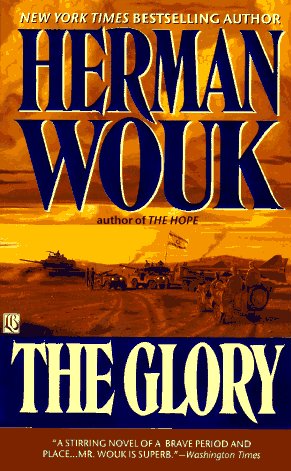The Glory

"The Glory" by Herman Wouk is the sequel to The Hope and continues the epic story of Israel’s struggle for survival and identity. The novel spans the period from the aftermath of the 1967 Six-Day War through the Yom Kippur War in 1973 and into the early 1980s, a time of both triumph and tribulation for the Israeli nation. Wouk’s story focuses on many familiar characters from The Hope—including Zev Barak, Benny Luria, and Sammy Pasternak—while introducing new characters who navigate the challenges of a country constantly on the brink of conflict. With the backdrop of shifting international alliances, internal political turmoil, and the ever-present threat of war, "The Glory" captures the spirit, courage, and dilemmas of a nation at war with both its enemies and itself.
"The Glory" is a richly detailed and engaging continuation of the saga Herman Wouk began in The Hope. While the first book focused on the founding of Israel and its early military and political struggles, "The Glory" takes a deeper dive into the challenges Israel faced in the decades that followed its establishment. The novel captures the complexities of Israel’s ongoing survival as it moves from one pivotal conflict to another, highlighting both the military victories and the devastating losses that shaped the country’s modern identity.
One of the strengths of The Glory is its ability to humanize the grand scale of historical events. Wouk does this by intertwining the fates of his fictional characters with real-life historical figures, giving readers a personal view of the political and military maneuvers that defined the era. The return of familiar characters like Zev Barak and Benny Luria adds continuity to the story, while their development reflects the changing landscape of Israeli society. Wouk’s characters are not just soldiers and politicians; they are individuals grappling with loyalty, duty, love, and the moral complexities of leadership during wartime.
Wouk’s research is thorough, and his portrayal of the military campaigns—particularly the harrowing events of the Yom Kippur War—is both gripping and realistic. He skillfully describes the strategies, tensions, and tragedies of battle, while also addressing the broader geopolitical implications of each conflict. These detailed accounts make the novel feel like an authentic military history, while the fictional elements provide an emotional core that draws the reader into the personal lives of those fighting and leading the war efforts. The narrative captures the intense pressure felt by Israel’s leaders and soldiers as they navigate one of the most turbulent periods in the nation’s history.
One of the central themes of The Glory is the internal conflict within Israel, both politically and socially. Wouk explores the challenges faced by Israeli leaders as they struggle with internal divisions, questions of identity, and the need to balance military strength with diplomatic efforts. These themes are highlighted through the interactions between characters who hold differing political views, showcasing the debates and tensions that arose within Israeli society during this time. Wouk's nuanced portrayal of these divisions makes the novel a thoughtful exploration of what it means to be a nation under constant threat and how a young country defines its place in the world.
While the novel is packed with action, military strategy, and political intrigue, it also includes moments of human drama and personal reflection. Wouk’s characters wrestle with love, loss, and the toll that decades of war take on their personal lives and relationships. These quieter moments provide a poignant counterpoint to the large-scale battles and political machinations, grounding the story in the human experience. This balance of epic history and intimate storytelling is a hallmark of Wouk’s style and what makes The Glory a compelling read.
However, the novel’s detailed military and political descriptions may feel dense for readers who are not deeply interested in military history or geopolitics. Wouk's commitment to realism means that the narrative sometimes leans heavily on strategic analysis and battle descriptions, which can slow the pace. Nevertheless, for those who appreciate well-researched historical fiction, these details add authenticity and depth to the story.
"The Glory" is a highly recommended read for fans of historical fiction, especially those interested in the modern history of Israel and the Middle East. Wouk’s novel is both a gripping military saga and a profound exploration of the human cost of war. The combination of real historical events and relatable fictional characters gives the story a powerful emotional impact, making it accessible to both history enthusiasts and general readers. If you enjoyed The Hope or are fascinated by tales of resilience, leadership, and the complexities of nation-building, The Glory is a must-read. It is an epic conclusion to Herman Wouk’s exploration of Israel’s early history, filled with passion, sacrifice, and the indomitable spirit of a nation that refuses to be defeated.